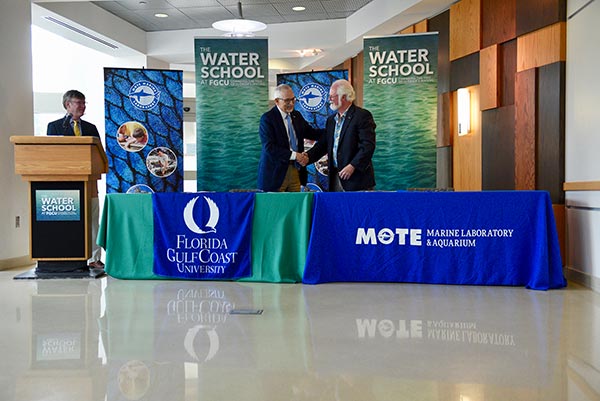Florida Gulf Coast University (FGCU) and Mote Marine Laboratory & Aquarium have entered into a Memorandum of Understanding (MOU) to kick off a partnership that addresses the impacts of harmful algal blooms (HAB) to Florida’s environment, economy and quality of life.
This MOU, signed by Mote President & CEO Michael P. Crosby and FGCU President Michael V. Martin, sets the framework for future collaboration between the two organizations.
“Working in partnership, Mote and FGCU will use science to develop innovative technologies to decrease the impacts of red tide and other harmful algal blooms,” said Crosby. “This MOU will facilitate collaboration through productive basic and applied scientific research, innovative engineering and technology development, and education related to harmful algal blooms. Our joint goal is to not just gain a greater understanding about the ecological forcing functions of red tide and other harmful algal blooms, but to actually do something to decrease the devastating impact of HABs to our environment, our economy and our quality of life.”

Mote and The Water School at FGCU will be pursuing productive scientific research, innovative technology development, and undergraduate and graduate education with a focus on harmful algal blooms. The MOU was signed Thursday, April 4.
“FGCU is very pleased to formalize an ongoing partnership with Mote Marine Laboratory,” said Martin. “Most assuredly working together, and with other colleagues across the state and nation, we can bring science to bear on the challenges of maintaining Florida’s critical water resources. This is a great day for FGCU and the citizens we serve, current and future.”
Several opportunities for partnership between the two organizations are outlined in the MOU, with a term of five years and the option to renew. Mote and FGCU will collaborate on:
- Improved understanding of dynamics and forecasting of harmful algal blooms;
- Developing effective and ecologically-sound mitigation technologies to decrease the adverse effects of harmful algal blooms; and
- Joint appointments of instructional and research faculty for undergraduate and graduate courses, procurement of funding for research, and implementation of cooperative research projects.
“We’re very excited about this partnership with Mote Marine Laboratory,” said Greg Tolley, who is leading The Water School at FGCU. “We have been working with Mote scientists off and on since we opened, but this new collaboration will bring together the best talent in Southwest Florida to address one of our most pressing water issues—red tide.”
– RELATED STORIES –
- New Water School, new approach to issues facing Florida
- Parsons receives $5.9 million to study toxic algae in seafood
About Mote Marine Laboratory & Aquarium
Mote Marine Laboratory & Aquarium is an independent, nonprofit, 501(c)3 research institution founded in 1955. Mote began and flourished through the passion of a single researcher, Dr. Eugenie Clark, her partnership with the community and philanthropic support, first of the Vanderbilt family and later of the William R. Mote family. Today, Mote is based in Sarasota, Florida, with six campuses stretching from Sarasota to the Florida Keys. Mote has more than 20 world-class research programs studying oceans locally to internationally, with an emphasis on conservation and sustainable use of marine resources. Mote’s vision includes positively impacting public policy through science-based outreach and education. Showcasing the Lab’s research is Mote Aquarium, open from 10 a.m. to 5 p.m. 365 days a year and located at 1600 Ken Thompson Parkway, Sarasota, Florida 34236. Learn more at https://mote.org, or contact us at 941-388-4441 or [email protected]
About The Water School at Florida Gulf Coast University
Located in the midst of Florida’s complex freshwater and saltwater systems, The Water School at Florida Gulf Coast University is uniquely positioned to explore water-based issues. The health of waterways impacts surrounding ecosystems, regional and state economies and people who rely on water for life and leisure. By taking a leadership role in this vital arena, FGCU acts as a catalyst for change in Southwest Florida and throughout the world. Through its interdisciplinary approach, The Water School at FGCU not only focuses on the environmental sciences, but also draws in the social sciences, business and engineering. For more information, visit https://fgcu.edu/TheWaterSchool.